| | NEWS
Murderers of Peace: The Story of R' Yaakov Yisroel DeHaan
by Noach Amir
R' Yaakov Yisroel DeHaan

This article was first published in 1995. Now in 5783 it is 99 years since these events.
For Part II of this series click here.
Seventy-one years ago, on 29 Sivan, 5784, three pistol shots put an end to intensive efforts which would have nipped the Jewish-Arab conflict in the bud, when Dr. Yisroel Yaakov DeHaan was murdered on his way home from ma'ariv by agents of the Zionist leaders. His death marked the end of the last efforts of the old yishuv to take an active role in the political and diplomatic processes that surrounded Eretz Yisroel. Without DeHaan, the rabbonim of the old yishuv felt they had no way to influence or even participate in international negotiations, and the Zionists were more than happy to assume full responsibility for the future of Eretz Yisroel and even for the Jewish people as a whole, Rachmono litzlan.
The attitude and general policy followed by our rabbonim towards the Arabs — seeking peaceful coexistence, willingness to compromise and high priority for human life — is not something adopted recently, but rather is the same consistent approach that was followed by HaRav Yosef Chaim Zonnenfeld and the other gedolim of the time a century ago. The rabbonim are guided by principles and not political expediency or a desire to favor one or the other political party.
Prior to his murder, Dr. DeHaan had worked for a long time to bring the views and attitudes of the rabbonim of the old yishuv to the attention of the Arab leaders. A long series of meetings and delegations, declarations and written summations took place under the direction and leadership of R' Yosef Chaim Zonnenfeld, zt'l, the rav of Yerushalayim.
Let us go back in time, to this lost opportunity for peace, which was struck down by the fist of evil. A peace which died, and left in its wake wars, terror, and death, and which led to the inescapable conclusion which echoes to this very day: The Zionists in those days did not want peace!
HaRav Zonnenfeld

The First Peace Plan
The image of the venerable sage and rav of Yerushalayim, Rav Yosef Chaim Zonnenfeld, stands in marked contrast to today's beleaguered leaders. With his amazing breadth of vision, R' Zonnenfeld already understood more than a hundred years ago that the only solution for modern Jewish life in Eretz Yisroel lay in a peace based on mutual understanding between Jew and Arab.
R' Yosef Chaim and his right-hand man, Dr. Yaakov Yisroel DeHaan, formulated a peace plan. They succeeded in arranging meetings with Arab leaders, during which a political document was drawn up. Had the Zionists agreed to accept the terms of this document, much bloodshed may have been averted. Today, everyone knows the truth: The Zionists did not want peace.
This fact, borne out by history, is impossible to ignore. The Zionists wanted national sovereignty. The Arabs were opposed to this then — and today.
Today, we have come full circle. Now, everyone wants peace, and the secular Israeli left claims that it invented the idea.
Not so long ago, they conducted a campaign of unbridled provocation, murdering the first Jewish diplomat who attempted, and all but succeeded, to end the Jewish-Arab controversy before it got out of hand. DeHaan paid with his life for the peace initiatives in which he took part at the behest of R' Yosef Chaim Zonnenfeld. With his death, these negotiations came to an end.
Today, political leaders have the audacity to speak of "murderers of peace," but it was their colleagues who struck the first blow. The one man who dared ignore the declared Zionist stand and make a stab at peace paid with his life.
The Balfour Declaration
On November 2, 1917, the famous Balfour Declaration, sent by British Foreign Secretary James Balfour to Lord Rothschild, was published. It stated:
"His Majesty's government views with favor the establishment in Palestine of a National Home for the Jewish people, and will use its best endeavors to facilitate the achievement of this object, it being clearly understood that nothing shall be done which may prejudice the civil and religious rights of existing non-Jewish communities in Palestine, or the rights and political status enjoyed by Jews in any country."
This document made a tremendous impression in the Jewish world, but, ever the realist, R' Yosef Chaim Zonnenfeld wasn't swept away by the mass hysteria. Much of the public imagined the dry, terse language of the Balfour Declaration as signaling the beginning of the redemption (aschaltah degeulah). R' Zonnenfeld, however, labored under no such false delusions.
Chaim Weizmann believed that the Arab problem should be viewed as a social dilemma. That is to say, he saw the tension between Arab and Jew as a conflict between the victimized farmer (the Arab) and the effendi who exploited him (the Jew). He was unwilling to even consider that there was a problem of Arab nationalism. Thus, for him, the Balfour Declaration was a virtual guarantee of a Jewish State.
In contrast, the rav of Yerushalayim understood the themes that operated behind the Balfour Declaration. It had been carefully phrased in such a way as to leave a loophole which the English could use to back out of their commitment. This loophole was the clause that referred to Arab nationalism: "...it being clearly understood that nothing shall be done which may prejudice the civil and religious rights of existing non-Jewish communities in Palestine..."
R' Yosef Chaim noted what the Zionist leaders overlooked. A "Jewish National Home" wasn't guaranteed. The ensuing years proved how right he was.
Furthermore, the Zionists aspired to drive out Arab workers and replace them with Jewish labor. This was known as "the conquest of labor."
"In order to achieve this," wrote Dr. DeHaan in a letter, dated 25 Adar, 5679 (1919), "we would need one hundred thousand idealists to replace the Arabs. In any case, Jews aren't able to live on the paltry wages that the Arabs subsist on..."
The rav of Yerushalayim and his faithful emissary, the legendary baal teshuva, viewed the condescending attitude of the Zionist chalutzim towards Israeli Arabs with profound worry. It was obvious to them that the Arabs, whose dignity was constantly being trampled, would eventually revolt.
The objective observer at the time, unhampered by personal considerations, couldn't help but sense the Arab hatred. This hatred was in no small measure the result of the humiliating and degrading behavior to which the Arabs were subjected at the time. The Zionists' behavior was often an expression of sheer racism. A story of the time went as follows:
"After leaving the ship, I went to eat in a Jewish inn. I asked the innkeeper:
"Do you accept Arabs here?"
"No, sir, I don't receive them here. They aren't clean."
"And if a clean Arab were to come?"
"He wouldn't want to pay our price."
"What if he would be willing to pay the price?"
"Even so, I wouldn't accept him. I don't take Arabs."
Factory owners who hired Arab workers were systematically boycotted by the Zionists who promoted Jewish labor. In at least one instance, the owner was beaten for his "impudence." Incidentally, since they controlled the labor unions, the insistence on Jewish labor gave them tremendous material power.
The rav of Yerushalayim, along with other gedolei hador of that time, maintained that the chareidi population should remain aloof from the nationalist line. Indeed, history has shown that their approach brought tremendous suffering and destruction. R' Zonnenfeld initiated a broad campaign of dialogues with Arab leaders, in order to formulate an agreement for living together that would prevent bloodshed.
Life in general, and Jewish life in particular, has always been the top priority according to the Torah hashkofoh. Life is of inestimable value, and certainly takes precedence over territory and national independence. The Sforno writes:
"`And Eisov ran'—His heart was turned in an instant, as a result of Yaakov's submission. As our sages have said: Achiya Hashiloni cursed Israel [saying they would be weak like] the reed, which sways in the wind. [However, implicit in this curse is a positive note: Because the reed is pliable and bends, it remains unbroken even in the fiercest gales.
"So, too, Klal Yisroel in golus. We learn from this that] had the hooligans humbled themselves during the period of Bayis Sheini, the Beis Hamikdash wouldn't have been destroyed, as R' Yochonon ben Zakkai attests (Gittin, Perek Hanizokin): `The hooligans among us don't allow us [to make peace.']" (Parshas Vayishlach)
Anyone seeking more explicit proof will find it in a letter written by HaRav Yitzchok Zeev of Brisk (the Brisker Rov) at a later stage, when the establishment of a Jewish state came under consideration. Dated 23 Teves, 5708 (1948) the letter was addressed to HaRav Yechezkel Abramski in London. In it, the Brisker Rav discussed the importance of dissuading the Zionist leaders from proclaiming a Jewish state:
"...In my opinion, we must use every means at our disposal to persuade [the Zionists] that compromise with the Arabs is possible, so that blood not be shed like water. The entire yishuv is in grave danger. I don't know if those in the Diaspora have even the vaguest notion of the danger and fear with which we live on a daily basis."
After describing the difficult situation, HaRav Yitzchok Zeev adds:
"...and in general, the entire issue of a Jewish state hinges on a state of war. Who knows what the outcome will be, especially since the Jews are a minority... and if we now have the opportunity to use our influence... to avert the danger of annihilation, ch'v, that threatens the entire yishuv...
"Has anyone ever heard of such a thing? To endanger the lives of an entire population and to refuse all compromise? Even among the nations, when one country finds itself in a situation similar to ours, other countries intervene in order to prevent the shedding of innocent blood. How much more, then, is it incumbent upon us, bnei Yisroel, for whom every soul is an entire world..." (published by HaRav Eliezer Shulzinger, Digleinu, Nisan 5740)
As we noted, this letter was written at the beginning of 5708, when the Jewish-Arab conflict in Israel was already at its height. Twenty-five years earlier, the rav of Yerushalayim had tried, with the help of his faithful emissary, the talented diplomat Dr. DeHaan, to avert the "Palestinian problem." He hoped to deal with the situation before it reached the stage in which life was endangered.
The Coronation of King Faisal of Iraq in 1921

A Meeting with King Faisal
Menachem Av, 5683. (1923) King Faisal arrived from Iraq in TransJordan, to visit with the Emir Abdullah. Dr. DeHaan, a close friend of the Emir, was invited to a lavish reception in the king's honor.
A meeting took place after the reception, between the Emir, the king, and DeHaan. The topic on the day's agenda: "Relations between the Jews and Arabs in Palestine." During the course of the meeting, there was a general consensus regarding the need to foster good relations between the two sides.
In the book Skitzen Fun Tog, (Lodz, 5685) DeHaan himself transcribes the content of the meeting:
"His Excellency King Faisal waited for us in his tent, which serves as a Parliament of sorts, for meetings and consultations of the TransJordanian government."
Upon meeting with the king, DeHaan recited the blessing "Blessed... who gives of his glory to flesh and blood."
"The King arose from his place, and his assistant Hamid Pasha introduced me: "This is the close friend of Sidney Abdullah, about whom Sidney has spoken with His Excellency."
"Ahalan vesahalam!" said the King.
Hamid Pasha left, and the King said to me: "You can ask me whatever you wish."
DeHaan wrote: "I first inquired as to why he had come to TransJordan."
The King answered: "In order to see my older brother, the Emir Abdullah. Who wouldn't be happy to visit a brother whom one hasn't seen in six years? In the interim, many things have occurred."
DeHaan: "What is the situation in Iraq?"
"Quiet," answered the King. "Very quiet... The economic situation isn't as good as one might wish, but it isn't worse than anyplace else. Dates are very inexpensive, and lower Iraq still hasn't developed sufficiently."
DeHaan: "What of the plans to establish an Arab Federation?"
The King: "If history demands it, this will also materialize. However, if it isn't necessary, why should anyone want it? (My father) Hussein of Mecca, is conducting negotiations with England. This being the case, is it proper for King Faisal to interfere? I am the King of Iraq," said the King, in a humble yet strong tone, "and the good of Iraq is close to my heart. I am indeed the son of the Sharif of Mecca... the King. Despite that, the problem of an Arab Federation is of secondary importance to me."
DeHaan: "And the Jewish question? The Palestinian question?"
"Yes, my brother," responded the King. "For me, there is no `Jewish question.' I live in the city of Baghdad, where Jews and Arabs have lived together in harmony for hundreds of years. This is as I wish it to continue. My treasurer, Mr. Sasson, is a Jew... in every government office you will find Jews..."
DeHaan: "And the Zionist question?"
"Yes, my brother," answered the King. "I am the King of Iraq... and Iraq is 700 miles away from Palestine. Besides, we have divided the political spheres between ourselves: My father and my brother Ali deal with general Arab politics. I am King of Iraq, and my brother Abdullah handles Syria, Palestine, and TransJordan."
King Abdullah of Jordan and his staff

Sidney Abdullah wished to speak with me. When I entered his tent, he was still in the midst of his prayers, and we therefore waited. Sidney Abdullah bears no resemblance whatsoever to his brother, Sidney Faisal. Short and wrinkled, his voice is strong, and he speaks in brief, concise sentences. He is very shrewd. In honor of his brother, King Faisal, he wore blue silk garments, a white kaffiah a gilded abbayah, (cloak) and expensive gold shoes.
"Ahalan vesahalam," I greeted the Emir, upon entering the tent. Emir Shakir, Medjal Pasha, Hamid Pasha, and Dr. Tu Farik all rose.
"I am happy to see you again," said the Emir. "Your visits are always a pleasure... Ahalan vesahalam!"
"Ahalan vesahalam," answered all the guests. Black coffee was served to everyone. Black and very sweet. The conversation was friendly.
Suddenly, the Emir arose. "My brother Faisal!" he exclaimed. The King entered the tent. Both he and the Emir sat down, and I sat opposite them.
"A Jewish Palestine? Who wants that?" said the Emir Abdullah forcefully. "Does England? Lord Millner... Lloyd George... Sir Martin Conway? Is there anyone at all who agrees with Weizmann's statement: `Palestine will be as Jewish as England is English?'"
"He didn't mean anything by it," interrupted King Faisal. "He (Weizmann) has to say that. It's all propaganda."
"Those are dangerous words," said the Emir. "All I can say is that I don't see a Jewish Palestine. As long as England rules in Palestine, the politics will be English. And as soon as the English pull out, the land will revert to the Arabs. For hundreds of years, it has been an Arab land."
"Yes," I responded. "But isn't the intent of the British Mandate to aid the Jews in creating a healthy economy, which they will then run independently? Isn't that the objective of the Mandate?"
"Intent isn't action," replied Sidney Abdullah. "I don't see a Jewish majority in Palestine... and the surrounding nations are Arab. Without peace, and I mean real peace, with the larger Arab world, you won't be able to live in Palestine.
"Do you think that when Weizmann says that the Jews have no desire for rights to Palestine, that we believe him? And when I say that the Jews wouldn't be subject to injustices under a legitimate government in Palestine, do the Zionists believe me? My country is open to the Jews. Likewise, my brother's country, as well as all other Arab lands.
"However, this is only on the condition that Jews don't demand special political rights, even in Palestine. You must choose: Peace and friendship with the entire Arab nation, or aspiring to the impossible in Palestine. I am in favor of Jewish-Arab cooperation based on equal rights in all Arab lands, Palestine included. If the Zionists are unable or unwilling to do this, let others, "Agudas Yisroel"... Traitors?—Yes, whoever is afraid... traitors... a big word!"
"Sidney Abdullah spoke quickly, and his last words were short and forceful. The King of Baghdad listened to the dialogue. Yet he remained silent, due to the distance of 700 miles that separate Palestine from Iraq."
DeHaan requested that the content of the meeting be transcribed, and the Emir Abdullah consented. At the bottom of the document, the king confidently signed his name and affixed it with the royal seal.
The following is another report of the meeting, written by R' Moshe Leib Bronstein, chairman of the Eida HaChareidis, as transcribed in the protocol:
"On Tuesday, 31 Menachem Av, Professor Yaakov Yisroel DeHaan travelled to Amman, in order to meet with King Faisal and the Emir Abdullah. During his interview with King Faisal... the latter expressed his opinion as follows:
`I, the King of Babylon, know better than anyone how friendly the relationship between Jew and Arab has been in the past. In Babylon, we have no prejudice against the Jews. Babylonian Jews have shown themselves to be good subjects, and my treasurer is a Jew by the name of Sasson. Indeed, there are many Jewish officials in every government division. The question of Zionism is pertinent to the land of Israel, and political matters concerning TransJordan, Eretz Yisroel, and Syria are under the jurisdiction of my brother, the Emir Abdullah.'
"Afterwards, Dr. DeHaan conducted a lengthy interview with the Emir Abdullah in the latter's tent. King Faisal joined them, and took part in this interview as well. The Emir Abdullah said that all Arab lands are open to the Jews, on the condition that they don't demand special political rights, even in Eretz Yisroel. Eretz Yisroel is ripe for a constitutional government, and as long as the majority therein are Arab, the government must, for the most part, be comprised of Arabs.
"The Emir, however, assured us that he wouldn't halt Jewish immigration, nor take any economic or political steps against the Jews. This, however, was on condition that the Zionists stop demanding special political rights.
"Unfortunately, extremists have caused great damage, and the Jews now believe that the formation of an Arab government would be to their detriment. For their part, the Arabs don't trust the Zionist leaders, even when they take a moderate stand.
"The Emir is prepared to enter negotiations with all Jewish organizations who aspire to peace and mutual understanding between Jews and Arabs based on equal rights. The Emir, being a religious man, expressed sympathy with the chareidi organization Agudas Yisroel. The conversation lasted almost two hours."
The procurement of Emir Abdullah's statement in writing was an important achievement. From a historic perspective, one might say that this document lends credence to the theory that Jewish aliya was possible, and such immigrants could have enjoyed full equality with the Arab residents.
Dr. DeHaan returned to Yerushalayim, with this document in hand. He considered it to be of major importance.
End of Part I
|




